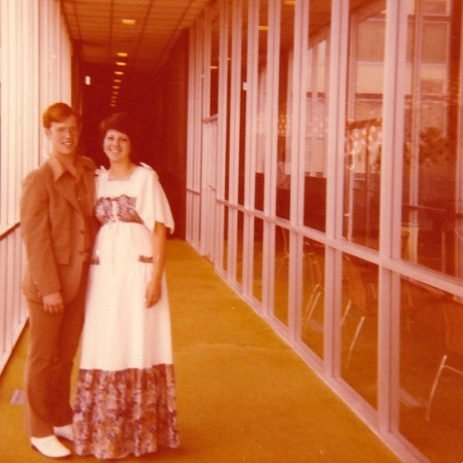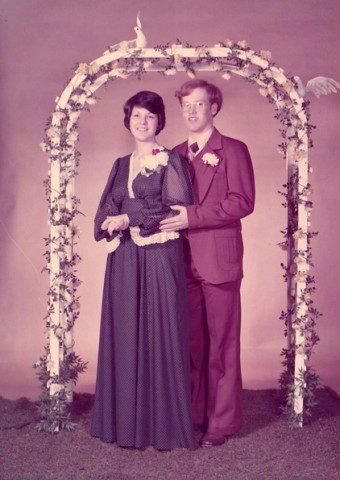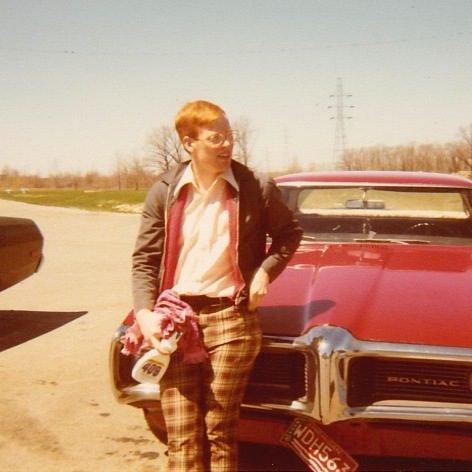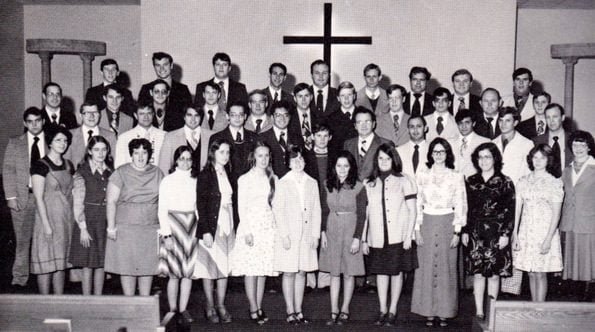
It was late September 1975. I had driven to Phoenix to spend the weekend with my twenty-year-old girlfriend Anita at the Southwestern Conservative Baptist Bible College. We had started dating six months prior, a relationship that quickly turned serious. Both of us had volatile personalities. Years later, I concluded that had we married, one of us would likely have ended up in prison for murdering the other.
Our weekend together turned sour, and by the time Sunday night arrived, I had broken up with Anita and angrily driven back to the home of my dad and his wife in the southeast Arizona community of Sierra Vista. I vividly remember driving my 1960s Chevrolet station wagon at excessive speeds for the three hours home, culminating in a speeding ticket near Huachuca City. The same state trooper had ticketed me the previous week for assured clear distance. He warned me that my next ticket could result in the loss of driving privileges. I was eighteen.
By the next weekend, I had packed my meager belongings in two suitcases, hopped a Greyhound Bus, and traveled to my mom’s home in the northwest Ohio community of Bryan. I left my car with my father to sell, which he soon did. I am still waiting for the money, fifty years later.
After returning to the place of my birth, I immersed myself in the life of First Baptist Church in Bryan, reconnected with friends such as Randy Rupp and Dave Echler, and became the dairy manager at Foodland, a local grocery store. I planned to wait a year and then enroll in classes at Briercrest Bible Institute in Caronport, Saskatchewan, Canada.
In early 1976, I turned my focus towards preparing for college. At the time, Canada had strict financial requirements for non-residents attending Canadian colleges. It became clear to me that I wouldn’t be able to meet this requirement, so I began looking at other Fundamentalist colleges to attend. I asked my pastor, Jack Bennett, for recommendations. He provided none. I came away from our discussion angry. I suspect Pastor Bennett thought that I was not qualified or well-suited to become a pastor, due to my family background and general orneriness.

My mom’s dad and stepmother lived in Pontiac, Michigan. They attended Sunnyvale Chapel, a Fundamentalist church. Upon hearing that I was not going to Briarcrest, the Tiekens suggested that I check out Midwestern Baptist College in Pontiac. In June of 1976, I drove up to Pontiac to check out the college. I quickly decided that Midwestern was where “God” wanted me to study for the ministry. In truth, Midwestern was much cheaper than other Independent Fundamentalist Baptist (IFB) colleges. Jobs were also plentiful. My grandparents, ever-helpful — until you crossed them — found a job for me working at the Rochester Hills Kroger. (Please see John and Dear Ann.)
I arrived at the Midwestern dormitory in late August 1976. A few weeks later, I started dating a beautiful seventeen-year-old dark-haired preacher’s daughter who would later become my wife.
Men lived in the basement and on the first floor of the dorm. Women were housed on the second floor. As one walked into the dorm, one entered a common meeting room. At certain times, dating couples could sit there six inches away from each other (please see Thou Shalt Not Touch: The Six-Inch Rule), and “fellowship.” To the right, down the hallway toward the section of the men’s dormitory called the “Spiritual Wing,” was the snack room. (I lived on the “Party Wing.” Of course, I did.)
While Midwestern had a school cafeteria that provided rudimentary breakfasts and lunches for students, most dorm students did not use the cafeteria. In my case, I was too busy taking a full load of classes and working a full-time job to fit going to the cafeteria into my schedule. Thus, for the two years I lived in the dorm, the snack room became my “kitchen.” I say “kitchen,” but that would imply it had basic appliances such as a stove, refrigerator, and cooking utensils. It didn’t. The snack room had a handful of tables and a microwave.
Most students either ate at nearby fast-food restaurants, ate out of a can, or warmed up meals in the microwave. Imagine the eating habits I developed from eating this way for two years. The highlight of each week was going out on a double date on the weekend to a real restaurant that served food that didn’t require a can opener. I will never understand why Midwestern didn’t care enough about dorm students to require that they eat at least two meals a day in the school cafeteria. Surely they had to know that students needed proper nutrition and sufficient nourishment; especially since students were spending virtually every waking hour attending classes, doing homework, working full-time jobs — often at local factories — attending church three times a week, working bus routes, teaching Sunday school, preaching, and going soulwinning. Whatever the reasons, dorm students were left on their own to scavenge for food. This led to numerous hilarious stories.
One evening, Polly decided to cook a special meal for me. She knew that I loved liver and onions. I had eaten it on one of our early dates at Jerry’s Restaurant. Polly bought one of those ribbed microwave “browning” plates and cooked liver and onions. Needless to say, an awful smell emanated from the snack room as Polly lovingly cooked for me. The taste was not much better.
One student worked at a nearby McDonald’s. Each night at close, the manager instructed him to throw away the unsold hamburgers. Not wanting to miss out on a free meal opportunity, the student brought the hamburgers home. Remember, there was no refrigerator — students were not permitted to have appliances or electric cooking implements in their rooms — so this student took to storing the hamburgers outside in a snowbank. More than a few of us afforded ourselves to one or more of Tom’s free hamburgers. It’s a wonder we didn’t get food poisoning.

Most students had a food box. I had a long cardboard box that I kept under my bed. It was not uncommon for students to trade foodstuffs. It was also not uncommon for food (and money) to come up missing. We may have been at Midwestern to serve God and train for the ministry, but hunger and an empty gas tank will turn the best of people into petty thieves. I put the blame for this not on a lack of character, but on the blindness and indifference of Tom Malone, the college president, and dorm supervisors to the financial and material plight of many single students. All the focus was on winning the lost. What’s a bit of hunger when souls need saving, right? I suspect some with the college administration believed that deprivation was good for students; that suffering hardship would make for better Christians, and for better pastors and missionaries. Midwestern advertised itself as a “character-building factory.” By the time I arrived at Midwestern, I had already lived through nineteen years of doing without. I knew how to adapt and survive, even if it meant swiping Hostess cupcakes and soft drinks from the grocery where I worked.
Polly, on the other hand, came from a solidly middle-class family — a new car every two years, annual vacations. Polly’s dad entered the ministry late in life, graduating from Midwestern in May 1976. Polly was grossly unprepared for the life that awaited her at Midwestern. Her parents gave her little, if any, financial support, expecting her to “survive” on the part-time wages she earned at places such as Burger King, Sveden House, and cleaning houses. Her means of transportation was a worn-out early-1970s AMC Hornet. After the car broke down, her parents told her to junk the car, with no new car forthcoming. Fortunately, her mechanically inclined boyfriend was able to fix the car. When it finally gave up the ghost, Polly drove my car. If it hadn’t been for me providing financial support and allowing her to drive my car, I doubt she would have made it through her dormitory years. Of course, I have a vested interest in making sure that didn’t happen.
While I have many fond memories from the two years I spent living in the Midwestern dorm, I do wish that the college had invested more money in the welfare of its students. Sadly, all too often, it seemed that students were just fuel for the machinery of the college and nearby Emmanuel Baptist Church — the megachurch all dorm students were required to attend. As a pastor, I had the opportunity to counsel church teens about their post-high school plans. While I suggested checking out schools such as Bob Jones University, Tennessee Temple, and Pensacola Christian College, I never recommended Midwestern. Had Midwestern cared better for its students, I may have sent students their way. It’s not that I am bitter about my experiences at Midwestern, I’m not. But the college could have been so much more had it not been so focused on soulwinning. The number of dorm students who didn’t return for their sophomore year was staggering. Midwestern prided itself on this winnowing process, sending home those who were “affectionately” called Momma-called, Daddy-sent preachers. By the time students reached their senior year, the majority of the students in their freshman class had dropped out. I wonder if this attrition could have been lessened had college officials truly cared about dorm student living conditions.
Bruce Gerencser, 68, lives in rural Northwest Ohio with his wife of 47 years. He and his wife have six grown children and sixteen grandchildren. Bruce pastored Evangelical churches for twenty-five years in Ohio, Texas, and Michigan. Bruce left the ministry in 2005, and in 2008 he left Christianity. Bruce is now a humanist and an atheist.
Your comments are welcome and appreciated. All first-time comments are moderated. Please read the commenting rules before commenting.
You can email Bruce via the Contact Form.

